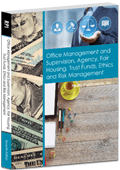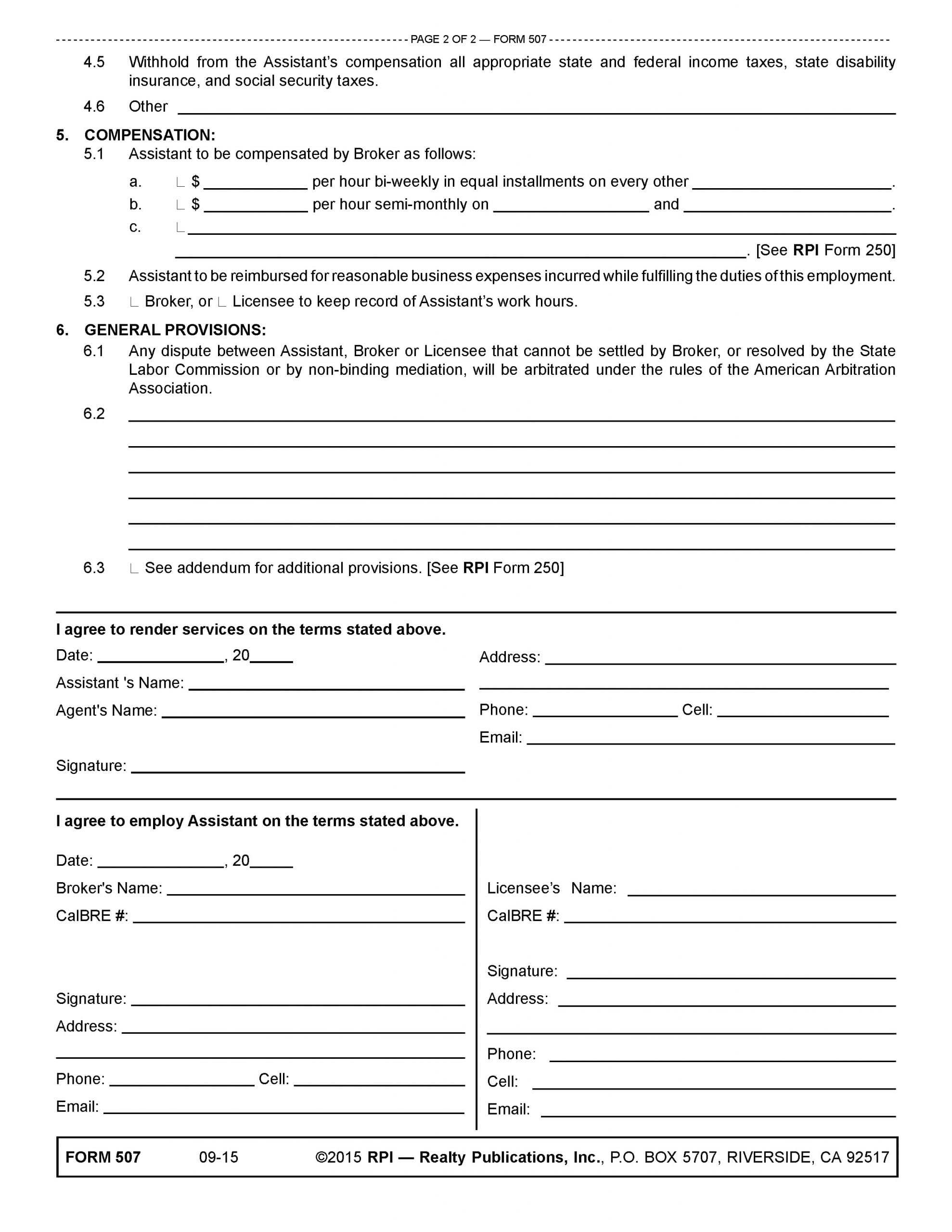Delegation of certain supervisory activities
A sales agent employed by a broker is the agent of the broker. In turn, the broker is the agent of the client. [See RPI e-book Real Estate Principles Chapter 2]
As an agent representing the broker, a real estate sales agent is authorized to prepare:
- listings;
- sales documents;
- disclosure sheets; and
- other documents on behalf of the broker.
A broker employing agents is required under the California Department of Real Estate’s (DRE’s) supervisory scheme to reasonably supervise sales agents’ activities. [See RPI e-book Agency Chapter 5]
Reasonable supervision includes establishing policies, rules, procedures and statements to review and manage:
- transactions requiring a real estate license;
- documents having a material effect upon the rights or obligations of a party to the transaction;
- the filing, storage and maintenance of documents;
- the handling of trust funds;
- advertisement of services that require a license;
- sales agents’ knowledge of anti-discrimination laws; and
- reports of the activities of the sales agents. [DRE Regulations §2725]
The broker may employ other licensees, such as an office manager or transaction coordinator, to carry out their supervisory responsibility to review documents and maintain files.
The review of documents and file maintenance is not just a mechanical function. It comprises a meaningful review of the activities of every employed licensee regarding:
- location of errors, such as in mathematical computations, and in contract and escrow provisions; and
- completeness, accuracy and timeliness of disclosures.
The broker, office manager or transaction coordinator reviewing documents ensures the sales agent cures any unacceptable documentation at the earliest possible moment.
A written agreement to carry out the broker’s responsibility for oversight and management of their sales agents’ activities in sales, leasing and mortgage transactions will be entered into between the broker and the licensed office manager or transaction coordinator they employ. [See RPI Forms 507 and 510]
While the office manager or transaction coordinator is assigned administrative duties, their primary responsibility is to review all correspondence and documents made or received by the agents on behalf of the broker.
Even though the broker employs the services of an office manager or transaction coordinator, the broker retains the overall supervisorial responsibility. Thus, the broker is to ultimately review the acts of the office manager, transaction coordinator, and in turn, each sales agent. [DRE Regs. §2725]
While acting as an office manager or transaction coordinator, the office manager or transaction coordinator owes the employing broker a duty to supervise. It is the broker who, in turn, is responsible to the client for any breach in agency duty caused by the office manager’s or transaction coordinator’s failure to supervise and correct an agent’s errors or omissions.
While most supervisory responsibility may be assigned to an office manager or transaction coordinator, the agency duty the broker owes to a client in a transaction may not be delegated to others. The broker’s agency obligations to the public cannot be avoided. [Barry v. Raskov (1991) 232 CA3d 447]
Related Video: A Broker’s Use of Supervisors
Click here for more information on this topic.
Transaction coordinator duties and limitations
Though a transaction coordinator (TC) may be licensed, brokers may also hire unlicensed assistants to perform administrative activities on their behalf and on behalf of their agents. [See RPI Form 507]
Unlicensed assistants act only under the broker’s constant supervision and control. [Calif. Business and Professions Code §10131.01]
Brokers may assign tasks to their unlicensed employees, such as:
- handling documents;
- performing tenant-related negotiations;
- opening a property to third-party service providers;
- assisting licensees with an open house; and
- communicating with parties to a transaction. [See RPI Form 507]
However, all unlicensed personnel performing on the broker’s behalf need to do so with the broker’s permission and have their activities continuously supervised. [Department of Real Estate Bulletin, Winter 1993]
Related article:
Brokerage Reminder: Unlicensed assistants and finders – supervision required
Handling documents
An unlicensed assistant employed as a TC often handles documents — such as sales files opened by agents and transaction documents from clients — to confirm their completeness.
Other documents and forms a TC reviews include:
- purchase and lease agreements, or other contracts;
- disclosure forms and reports;
- inspection reports; and
- escrow and title reports and forms.
Here, the TC is tasked with confirming the completeness of the documents. Any form or document not complete or fully executed by all required participants is brought to the attention of the agent to remedy. Only on the agent’s instruction may the document be forwarded to the client or participant for signing or acknowledgement of receipt.
TCs and assistants may prepare documents as instructed by the agent. Once complete, all documents prepared by the assistant are then reviewed by the agent prior to delivery to any participant in the transaction. Here, the work of the TC and assistant is purely mechanical and not discretionary.
On instruction from the agent, an assistant may deliver or obtain documents relating to the transaction directly to and from the client. They may also obtain signatures on documents from any participant in the transaction. However, an unlicensed assistant may not discuss the content or significance of the document with any participant to the transaction — an activity requiring a DRE license. [DRE Bulletin, Winter 1993]
Related article:
Performing tenant-related negotiations
In the rental and leasing of residential complexes, other than single family units, an unlicensed assistant may perform tenant-related negotiations, such as:
- showing rental units and facilities to prospective tenants;
- providing information about rent rates and rental and lease agreement provisions to prospective tenants;
- providing rental application forms and answering questions regarding their completion to prospective tenants;
- accepting tenant screening fees;
- accepting signed lease and rental agreements from tenants; and
- accepting rents and security deposits. [Bus & P C §10131.01(a)(1)]
Related article:
Opening a property to third-party service providers
An unlicensed assistant, with the property owner’s permission, may open the property to third-party service providers to perform inspections or repairs related to the transaction.
However, an unlicensed assistant may not provide information to the inspector or repairperson regarding the property — unless they provide it as transmitted from a data sheet the agent has prepared. The assistant is also required to disclose the source of the data to the person receiving the information. [DRE Bulletin, Winter 1993]
Assisting with open house and marketing activities
An unlicensed assistant, with the property owner’s consent, may perform nondiscretionary activities while helping an agent at an open house for the sale of a property, such as:
- providing pre-printed fact sheets which the agent has previously prepared and approved;
- arranging appointments; and
- greeting the public.
However, when assisting an agent at an open house, assistants may not:
- show the property;
- discuss pricing, terms and conditions of the sale; or
- discuss the property’s amenities (e.g., neighborhood, schools, etc.).
Further, any solicitation beyond providing information approved by the agent, such as a flyer, may only be conducted by the agent. [DRE Bulletin, Winter 1993]
Under the agent’s supervision, assistants may also prepare and design advertising, brochures and flyers in connection with the sales transaction. All need to be carefully reviewed and approved by the agent prior to use.
Related FARM letters:
Communicating with transaction participants
Unlicensed assistants may arrange and schedule appointments for agents to meet with principals or members of the public relating to an existing or potential real estate transaction. They may also arrange appointments for services to be provided by third parties, such as pest control companies, home inspectors or appraisers.
However, when making appointments, the unlicensed assistant may not discuss any details related to the transaction or property conditions — their role is purely secretarial.
Further, assistants may communicate directly with principals regarding:
- the timing of the delivery of reports or other information needed; and
- any information relating to the performance and completion of third-party services.
When communicating with the public, assistants may also provide facts to others from writings which the agent has prepared — again advising on the source of the data.
Related article:
Marketing and closing efficiently with a transaction coordinator
The employment agreement for transaction coordinators
Hiring unlicensed assistants to act as TCs provides time-saving and organizational benefits — and is essential to effectively managing the business activities of brokers and agents. Understanding the limitations imposed by the DRE and state law allows agents to delegate activities to their assistants without crossing the line into licensed activities.
An employing broker uses the Assistant Employment Agreement — Unlicensed Administrative Assistant form published by Realty Publications, Inc. (RPI) when entering into an agreement hiring an unlicensed administrative assistant for the broker or a licensee employed by the broker. The agreement sets forth the assistant’s activities and compensation, while also establishing the supervisory role of the broker and the licensee. [See RPI Form 507]
The Assistant Employment Agreement contains the:
- Facts of the employment. It identifies the employing broker, the assistant, and whether the assistant performs duties on behalf of the broker or another licensee, and also that the assistant is an employee subject to income tax withholding and unemployment insurance coverage [See RPI Form 507 §1];
- Agreements of the Assistant [See RPI Form 507 §2];
- Agreements of the Licensee [See RPI Form 507 §3];
- Agreements of the Broker [See RPI Form 507 §4];
- Compensation information, including the amount and frequency of the assistant’s compensation, a statement asserting the assistant will be reimbursed for reasonable business expenses incurred while fulfilling the duties of the employment, and clarifying whether the broker or licensee will keep a record of the assistant’s work hours [See RPI Form 507 §5];
- General Provisions regarding dispute resolution [See RPI Form 507 §6]; and
- Signatures of the assistant, broker and licensee. [See RPI Form 507]
Related article:
Brokerage Reminder: Transaction coordination sheets – your checklist to success
Office manager duties and limitations
When an employing broker becomes too busy to provide continuous oversight over all licensees, they may employ a licensee to act as an office manager to carry out the employing broker’s supervisory responsibility to review documents and maintain files. [See RPI e-book Office Management and Supervision Chapter 6]
The employing broker and their office manager review documents for unacceptable or incorrect activity and take necessary steps to correct any errors in a timely fashion. A lack of corrective action will expose the broker and their manager to liability for money losses incurred by the staff working on behalf of the broker, whether through error or malfeasance.
In addition to reviewing documents, the responsibilities of the appointed office manager include:
- oversight and supervision of day-to-day operations of all licensed activities in the real estate branch or division [Bus & P C §10164(a)];
- supervising the on-the-job activities of employed licensees; and
- managing unlicensed clerical staff employed in the branch office or division. [See RPI Form 507]
An office manager also assumes obligations for any sanctions and disciplinary actions by the DRE for their failure to properly supervise the activities of licensees and administrative employees on behalf of the employing broker. [Bus & P C §10164(b)]
When employing a licensee to carry out a broker’s responsibility for the oversight and management of their licensed and unlicensed staff, a written and signed agreement is necessary. [Bus & P C §10164(c); See RPI Form 510]
However, while an office manager carries out the duty to supervise employees, the employing broker retains overall supervisorial responsibility. An employing broker’s duty to supervise cannot be entirely delegated to others. Thus, the employing broker needs to periodically audit and review the actions of an office manager, and in turn, each employee. [DRE Regs. §2725]
Related article:
Brokerage Reminder: Branch office managers share responsibility for oversight and management
The employment agreement for office managers
Licensees who may not be employed as an office manager include individuals who:
- hold a restricted DRE license;
- have been debarred by the DRE; or
- are salespersons with less than two years of full-time real estate experience within the past five years prior to the appointment. [Bus & P C §10164(d)]
An employing broker uses the Office Manager Employment Agreement published by RPI when employing a licensee as an office manager for their broker operations. The agreement establishes the office manager’s duties and the fee schedule for their earnings. [See RPI Form 510]
On employing an office manager, employing brokers are required to notify the DRE by preparing and filing the Branch or Division Manager Appointment form provided by the DRE. [See RE 242]
Likewise, on termination or change in the appointment of an office manager, brokers are to promptly notify the DRE in writing by filing the Branch or Division Manager Appointment form. [See RE 242]
The Office Manager Employment Agreement contains the:
- Agreements of the Office Manager [See RPI Form 510 §1];
- Agreements of the Broker [See RPI Form 510 §2];
- Fee Schedule for the Office Manager, including the percentage amount of the broker’s share of gross fees [See RPI Form 510 §3];
- Termination Provisions [See RPI Form 510 §4];
- General Provisions regarding dispute resolution protocols [See RPI Form 510 §5]; and
- Signatures of the office manager and employing broker. [See RPI Form 510]
Related article:
Want to learn more about transaction coordinators and office managers? Click an image below to download the RPI books cited in this article.
























